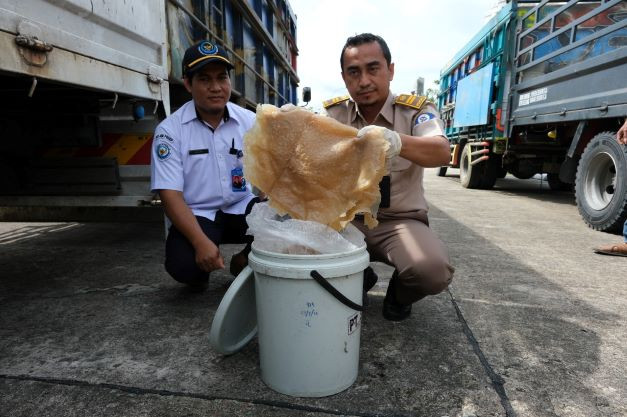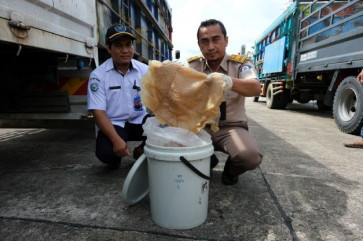Popular Reads
Top Results
Can't find what you're looking for?
View all search resultsPopular Reads
Top Results
Can't find what you're looking for?
View all search resultsIs Indonesian economy already facing headwinds?
As most of the investments were aimed to tap windfall from the commodity sector, with its short business cycle, they would not be sustainable in the long term.
Change text size
Gift Premium Articles
to Anyone
 Export commodity: A quarantine officer at the Entikong border post in the West Kalimantan regency of Sambas displays jellyfish to be exported to Malaysia on Oct. 19, 2022. The quarantine authorities facilitated exportation of jellyfish worth Rp 5.9 billion (US$380,000) to help the local economy grow. (Antara/Jessica Helena Wuysang)
Export commodity: A quarantine officer at the Entikong border post in the West Kalimantan regency of Sambas displays jellyfish to be exported to Malaysia on Oct. 19, 2022. The quarantine authorities facilitated exportation of jellyfish worth Rp 5.9 billion (US$380,000) to help the local economy grow. (Antara/Jessica Helena Wuysang)

Bali has every reason to celebrate, not only because it was at the center of the world attention when it successfully hosted the Group of 20 Summit early last week, but also because its economy, notably its tourism industry, received a big boost from the series of international conferences.
But the joy of the Balinese is overshadowed by economic headwinds that have been slowly blowing to other provinces. Reports have emerged of the increasing worker layoffs in some parts of Java. Labor-intensive manufacturing -- textile, footwear, electronics -- have been shedding hundreds of thousands of workers, as orders from overseas are shrinking. And more layoffs may be imminent.
It seems that the country is not immune to the bleak global economy, still reeling from the pandemic, which is now battered by high inflation, rising interest rates and energy and food insecurity caused by the war in Ukraine.
But amid these gloomy world prospects, the Indonesian economy still showed strong recovery in the nine months to October, with 5.4-percent growth year-on-year (yoy), after growing 3.7 percent in 2021.
Government consumption shrank by 4.7 percent and remained a drag on growth, as it is winding down the pandemic-related expenditure. But private consumption, export and gross fixed-capital investment more than offset the slack in government expenditure.
Gross fixed-capital formation rose 5 percent in 2022 compared with 3.8 percent in 2021. These are in line with the figures published by the Investment Coordinating Board (BKPM). Realized domestic and foreign investment in the first half rose by 32 percent to Rp 585 trillion (US$39 billion). But most of the investments were put into mining and mineral-processing industries.
In response to the commodity boom, investment in the mining sector almost tripled from Rp 6.5 trillion in the first quarter to Rp 18.4 trillion in the second quarter. This trend raised questions about the quality of investment, as most of the investments were channeled to the commodity sector, which usually has short-term business cycles.


















